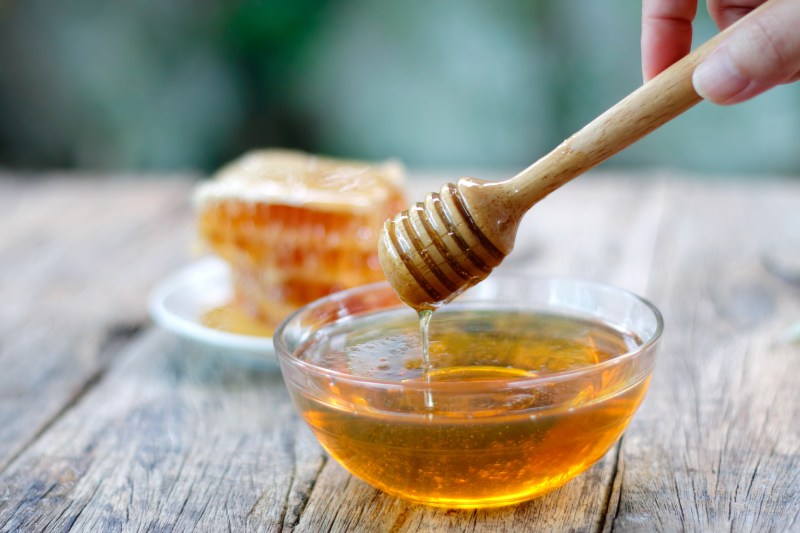
Sometimes said to be a healthier or more natural sweetener than cane sugar, honey is steadily becoming more popular. But is it really any better for you than other forms of sugar? Honey is found in many cooking recipes; you might drizzle it on your oatmeal breakfast or you might cook with it for your honey garlic salmon. Maybe you’re using honey as a sweetener in your morning tea or your bee’s knees cocktail. Either way it’s important to learn more about this versatile food substance.
We dive into the sweet sticky food that is honey, its health benefits or risks and more. Read on to learn everything you need to know about this thick golden liquid and how to balance it in your diet.
Related Reading
How is Honey Made?

Honey comes from beehives, where it is produced in excess of the colony’s needs. This excess is typically where the honey you eat came from. Although enjoyed by some humans, honey is actually food made by bees and meant for bees. Honey is made when bees gather nectar, slightly change its composition via enzymatic action, and regurgitate it.
Freshly harvested honey may contain traces of beeswax, bee pollen, and body parts of dead bees. Many honeys are pasteurized to kill any bacteria that might be in them. Other “raw” honeys are bottled after coming straight from the honeycomb.
Is a spoonful of honey a day good for you?

Honey is less calorically dense than refined sugar per gram. However, while honey is denser than refined sugar per tablespoon, they are about equal in carbs (~15g) and calories (50-60). By eating a tablespoon of honey each day, you are adding that many more calories to your diet.
And while it is true that honey contains some nutrients, many commercial honeys have been processed in a way that strips them of those already scant nutrients. Now, you might be thinking, “Is raw honey good for you?” Raw honey might maintain the initial nutritional content of the product, but you shouldn’t count on any form of honey as a source of vitamins or minerals because their concentrations are extremely low: less than 1% of the recommended daily intake of each.
High-quality honey does have some antioxidants in it. Antioxidants work to prevent cell damage in the body by fighting disease-causing particles; consumption may contribute to lower rates of chronic diseases like cancer and heart disease. Among the particular antioxidants found in honey are phenolic acids and flavonoids, which may also help decrease inflammation.
Honey Health Benefits

There have been few health benefits shown to come from most kinds of honey. A possible exception to this is Manuka honey. Manuka honey is made from the nectar of the Manuka tree, which is native to Australia and New Zealand. Manuka trees are now often grown in the United States as well, so domestically made Manuka honey is sold there.
A unique antibacterial compound, methylglyoxyl, is found in Manuka honey. It may have action against methicillin-resistant Staphylococcus aureus (MRSA) as well as some strains of Escherichia coli (E. coli), which are both common causes of infections in hospitals. Another thing Manuka honey does is lessen the time it takes for wounds to heal. In the United States, the FDA approved Manuka honey as a wound treatment in 2007. But Manuka honey does more than just treat existing conditions.
Manuka honey appears to have some preventive effects on the body. One study showed that consuming Manuka honey, but not commercial honey, resulted in decreased amounts of harmful bacteria in the mouth. Manuka honey also controlled levels of harmful bacteria in the digestive tract to help prevent oral mucositis.
How much honey should you eat a day?
If you choose to use honey, use it like you would use any sweetener; sparingly. At the end of the day, sugar content is processed the same in your body. You might consider swapping out refined cane sugar for high-quality honey.
As for limits of honey consumption? The American Heart Association recommends no more than three tablespoons of added sugars for men and no more than two tablespoons for women per day.
And there are some groups that should avoid consuming honey at all. If you have diabetes or are allergic to bees you could react negatively. Infants under the age of one shouldn’t be given any form of honey so as to avoid an infection known as infant botulism.
What are the side effects of eating honey?
Keep in mind that honey is not naturally found in any fruits or vegetables just as refined cane sugar is not. Honey may be less processed, but it is no more “natural” than refined cane sugar. When you think of “natural” sugars, you should think of those that naturally occur in fruits and vegetables. In addition to its purported health benefits, consumption of honey has all the same side effects as refined cane sugar.
Consistently consuming too much of any kind of added sugar is associated with higher rates of raised blood pressure, chronic inflammation, fatty liver disease, and heart disease. Partially because added sugars aren’t satiating, it’s easy to eat too much, which is associated with weight gain.
Is honey good for weight loss?
Any form of sugar adds a lot of extra carbs to your diet, which is probably what you don’t want when you’re trying to lose weight. Calorically dense and full of sugar, honey may have some health benefits but it is also a type of added sugar. If you’re consuming large amounts of honey, you should not consume much other sugar. And if you’re not burning off those calories, consumption of added sugar contributes to weight gain over time. Using honey in place of sugar may overall be a good idea for you, just be sure you don’t overdo it!



